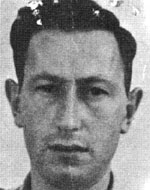Rav, Moshe (Alter)
Son of Michael and Dvora, of blessed memory. Born on 19.12.1920 in Boislawice, Poland, he immigrated to Israel in 1942. Moshe studied in a public elementary school in Warsaw and at the Tachkemoni High School in Poland. His father, who was an enthusiastic Zionist activist, left him the loyalty to the Zionist idea, which influenced him in choosing his way of life. His father died when Moshe was quite young and had to take part in the livelihood of his large family. Moshe was well-versed in the social life of the school and he led his Jewish friends to the island of restraint for provocation by the Polish children. Despite the time he was forced to devote to work in his father’s shop, he did not neglect his activity in the Zionist youth movement. He was an active instructor in the Zionist youth movement that was established in his city and devoted all his energies to deepening the awareness of the Land of Israel, to the public’s contribution to the Zionist enterprise, the sale of stamps of the Jewish National Fund and the study of Hebrew songs. In 1939, when the war broke out between Germany and Poland, Moshe moved with many Jews to eastern Poland and managed to reach the city of Vilna with many risks. He aspired to immigrate to Eretz Israel. But following the Soviet occupation, the road was blocked. Finally, Moshe managed to organize himself in a group of Jewish youths who had immigrated to Israel via Japan. Among the members who immigrated with him to Israel were Yechiel Kadishai, Menachem Savidor and others. Moshe was absorbed very quickly in the ranks of the Irgun and was appointed to Gondar, where he found great satisfaction in his activities and devoted all his efforts to this war and to the British, who was the only member of his family to escape the Holocaust. His eldest son was born four years later, and four years later he was born into a family of his wife as a son, was treated warmly and sympathetically and was a devoted father to his children and a loyal husband to his wife. He devoted himself to his work in the Israel Defense Forces and advanced quickly on the ranks, and when he was discharged from regular army service, he volunteered for the career army and despite the fact that he often received tempting job offers in the civilian market. During his service Moshe took an officer’s course and was promoted quickly. In 1963 he was awarded the rank of Major, and he was very proud of his rank and position. Moshe was very devoted to his work and received letters of appreciation and thanks from his commanders for his diligence and his great contribution to the success of the missions he took part in. In 1976, his commander, the head of the General Staff’s Training and Training Branch, wrote: “Upon completion of the printing of the maintenance boards, I would like to thank you and appreciate this work that you have been working on for a long time, thanks to your diligence, dedication and perseverance. Great. ” In his opinion of Moses, his various commanders applauded him as “a dedicated and punctual officer of a comfortable nature and an ability to adapt to all those around him.” His friends and family attest: “Moshe was a dear and gentle man, he was careful in the dignity of others, never harmed anyone, was honest and clean, full of faith and innocence, always willing to help and help his friends and family. One as a brother and a loyal knight. ” On the 17th of Cheshvan 5737 (November 12, 1974) Moshe fell while serving. He was laid to rest in the military cemetery in Kiryat Shaul. He left behind a wife and two sons.
